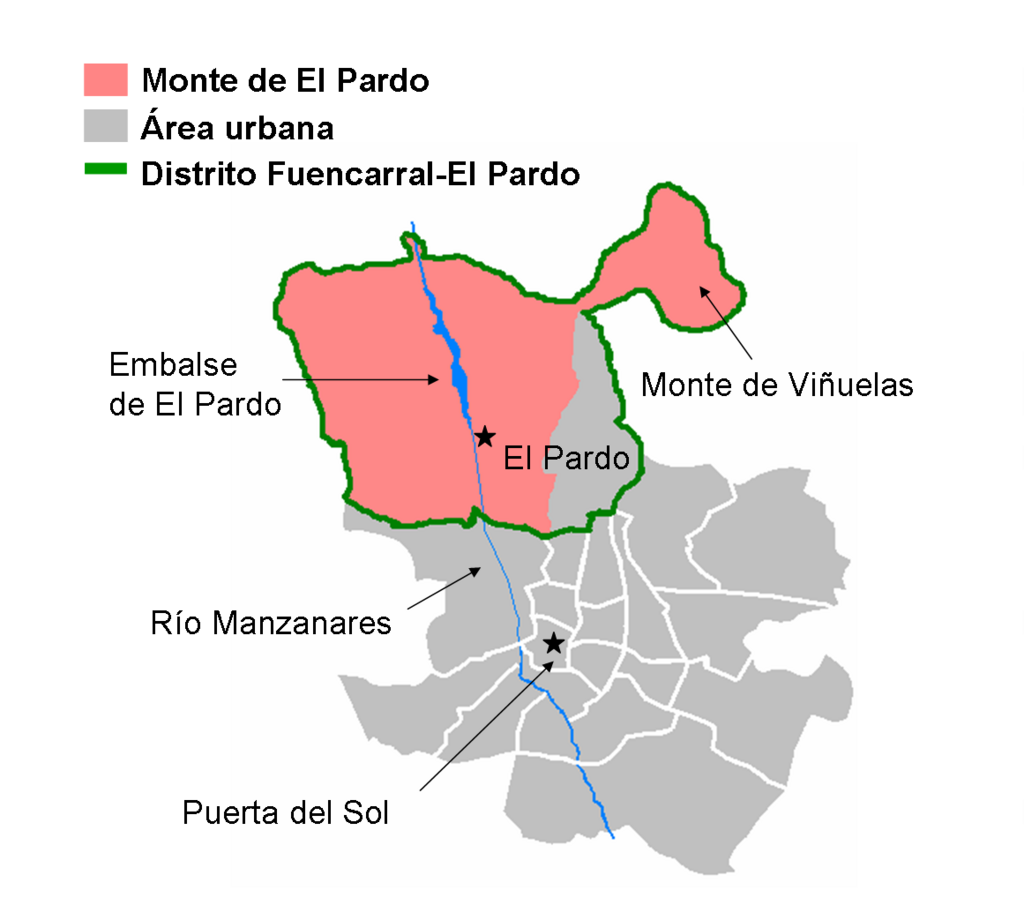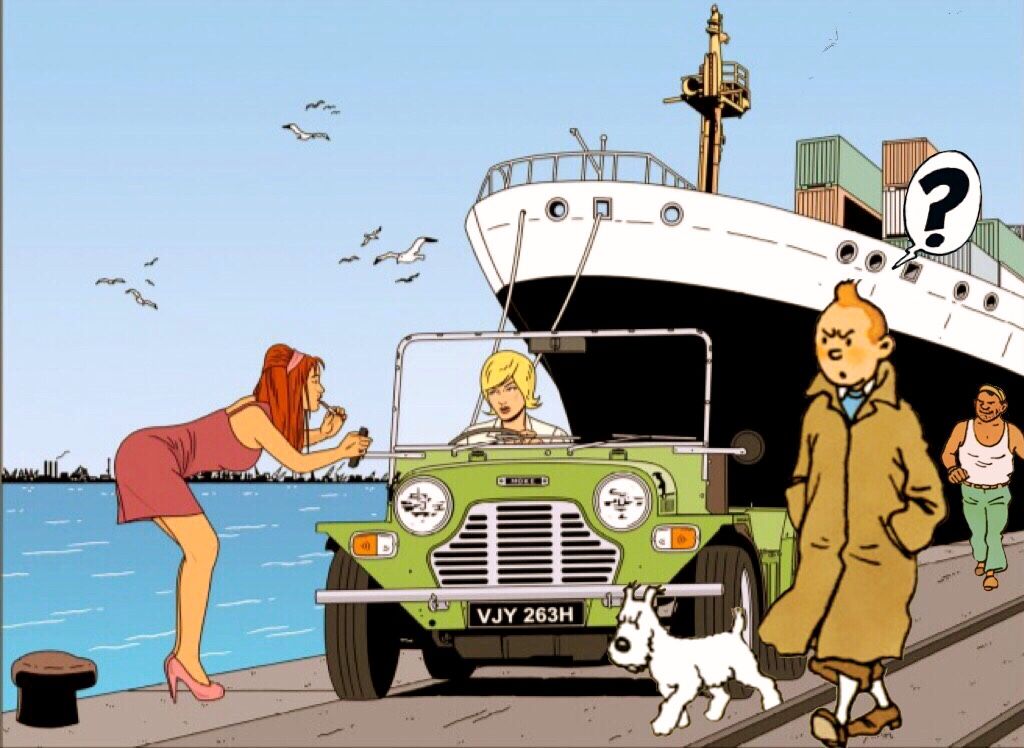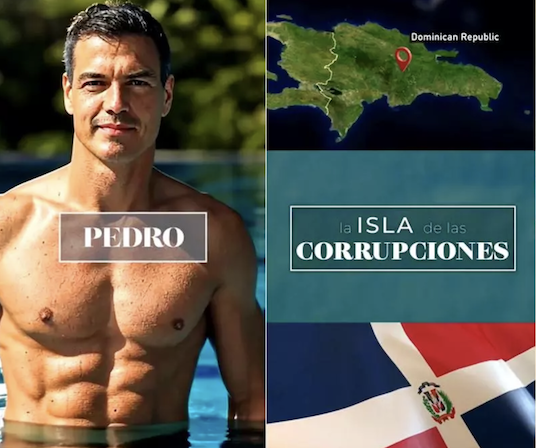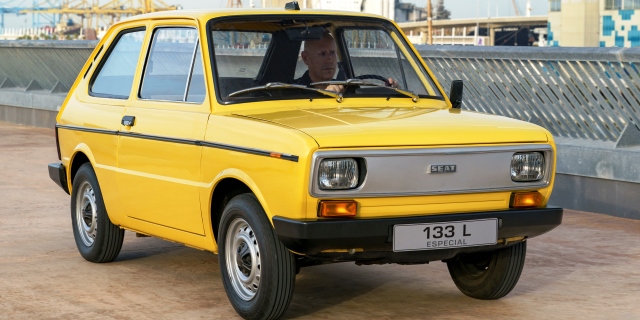Low Hanging Fruit: The Iberian Funeral Saga (Peace of Mind)
Sunday, March 30, 2025
It all began with a post in Facebook: ‘I’ll be going to the Guardia sometime this week to make a denuncia regarding Iberian Funerals. If anyone is in the same position and wants to come with me, you are welcome’.
The Olive Press leads with ‘The Iberian Funeral Plans (their webpage here) scandal is a disgraceful betrayal of the British expat community in Spain’. The company abruptly closed last week following the death of its owner. The other partners were unavailable for comment, and the head office is said to be closed. 
Who are they? We find a gusher from The Euro Weekly News back in 2022: ‘Funeral Plans in Spain and Portugal: Look after your loved ones with an Iberian Funeral Plan’.
However, from two weeks ago they say this: ‘Recent reports indicate that Iberian Funeral Plans may have stopped operating, leaving many individuals uncertain about what will happen to their prepaid funeral arrangements’.
The company's Facebook page ‘is unavailable’. The company registry for Iberian Funeral Plans (and for Iberian Services Funerarios SL), both based in Alhaurin el Grande, Málaga, is here.
Citizen Advice Spain has ‘An Advisory for Affected Individuals of Iberian Funeral Plans’ here.
A later post from CAS reads: ‘Following further investigation, it has been confirmed that Stephen George Nelson, the sole owner of Iberian Funeral Plans, passed away approximately two weeks ago. For the moment, it appears that there is no indication of any wrongdoing or intent to mislead those who hold funeral plans…’
Various threads on Facebook regarding IFP are here.
The last notice regarding Iberian Funeral Plans is at The Olive Press here (unlike The Euro Weekly, they have investigative journalists): 'Expats demand urgent regulation of the funeral plan sector in Spain after the collapse of Iberian'. Describing the company as 'dodgy', the paper says 'Our investigation suggests the number of clients left with worthless contracts after the collapse of Iberian Funeral Plans could run into the thousands.
And with each policy costing over €3,000 (and sometimes as much as €7,250) the money missing is well into the millions of euros.
The disappearance of Iberian – as reported on our front page last issue – has left the expat community in tatters with joint legal action being threatened and many fingers being pointed'.
The paper then quotes an ex-employee as saying, 'I’ve been told it is unlikely that anyone will get any money back”.
A spokesperson for a rival company says: “Pre-paid funeral plans in Spain generally target expatriates, while Spanish nationals often use alternative methods for funeral expenses.”
At any rate, whether the family of Steven Nelson (they live in the UK) are to step forward or otherwise, the company motto 'Peace of Mind' will not be providing much comfort to those affected.
And thus we appear to have come to this once again, we Brits have been found to be the low-hanging fruit, easily exploited and taken for a ride by our fellow-citizens. Will the Spanish authorities learn from this - perhaps by tightening the rules for this form of speculation - or will they say - well jodér, it's just some guiris ripping off other guiris.
One remembers the unregulated financial advisers, and later the asset management crooks (I see, they are returning once again). So, it's caveat emptor out there: be warned and be careful.
Later: The Olive Press has an update - a rather sinister one - on the company as the owner is confirmed to have died in Portugal.
 1
Like
Published at 8:02 PM Comments (0)
1
Like
Published at 8:02 PM Comments (0)
Spain's Capital City
Monday, March 24, 2025
Madrid is an interesting city.
How it became the capital of Spain (remember that word, ‘capital’) is an interesting story as well.
There wasn’t much going on in Madrid back in the XVI Century. It counted with a small population and of course it wasn’t on the sea or even on a decent river (the Río Manzanares is almost always nothing more than a trickle, although in the last week it’s certainly true to say that it has reached its highest level in donkey’s years). Madrid’s main industries were of court, religious or political interest rather than making anything useful.
Other nations had their capital cities where they could enjoy good communications and better trade.
One of the city’s attractions for the Royal Family was the gigantic private hunting park, 16,000 hectares in size – which took up a full quarter of Madrid and which was and is to this day closed to the commoners: the Monte de El Pardo. There’s a huge palace there, General Franco was one of its tenants.
King Juan Carlos even built a house in the park for his lover Corinna Larsen, without anyone – including his Queen – being any the wiser.
The fence around the Monte de El Pardo is 66 kilometres long.
In 1561, when Madrid with its modest population of 20,000 became Spain’s capital city, there was no port, no industry, no commerce, no cathedral, no university, and no navigable river. But, on the bright side, there were plenty of fallow deer and stags for the king's enjoyment.
The previous Spanish capital, from 1519 to 1561, had been Toledo (it was also the country’s largest city), although it’s true to say that the seat of power has tended to jump about a bit along the Spanish timeline (including Seville - twice - in 1729 to 1733 and then again between 1808 and 1810), plus Cádiz, Córdoba and don’t forget Cangis de Onis in Asturias, where la Reconquista began, along with Valencia, Barcelona, Gerona, Figueras and Burgos – these last five during the Spanish Civil War), but from the point of view of the Monarchs, Madrid was far better suited (and they didn’t have to share the limelight with the Toledo bishops).
One of the cleverest of the grandees, back in the first half of the XVII Century, was Francisco de Sandoval y Rojas, the first Duque de Lerma. He is described as ‘the most powerful man during the reign of Philip III. He became immensely wealthy through his skill in corruption, influence peddling, and the sale of public offices’. Furthermore, he persuaded the king to move his court to Zaragoza in 1601 (having previously bought up most of the better real estate there) and then talked the king into returning his court back to Madrid in 1606, having been busy in the property market in that city too.
Some traditions in Spain are just too good to die.
The Duque ended up under a cloud, as sometimes happens when speculators are found out (viz, current events), but he built a large palace for himself in Lerma, a building which is now a Parador Hotel, to keep himself busy.
His elegant solution to his financial chicanery was to ask the Pope to make him a cardinal (senior churchmen had full immunity in those times, similar to that enjoyed by today’s politicians) giving rise to a popular saying:
‘To avoid the rope,
Spain’s greatest thief,
Pays off the Pope’.
“Para no morir ahorcado / el mayor ladrón de España / se viste de colorado”.
Again, it’s maybe safe to say, some things never change.
 2
Like
Published at 6:58 AM Comments (1)
2
Like
Published at 6:58 AM Comments (1)
To Each Their Own
Sunday, March 16, 2025
I’m surprised we don’t have an identity. There are 307,000 Brits living in Spain and perhaps a million stretched across the whole of EU (nobody seems to know how many). Then there are all those EU nationals who live in another EU country than their own, plus all those who came from somewhere else – South America, Northern Africa, China, The Ukraine and Timbuctoo.
How many is that?
In Spain, there are around 8,500,000 people who are foreign-born, and across the whole of European Union of 450 million souls, we are talking about some 60 million ausländers of one sort or another who have chosen a (new) EU country to make their home.
Begging the question, who are they?
Broadly speaking – we foreigners have come here either to work or to retire.
The workers may be those poor folk who arrived here through economic necessity, sometimes risking their very life for the chance of a better future, or maybe they flew here with just a good job-offer in their pocket.
The retired folk, perhaps because we live better over here (I’m thinking of – oh my Lord: it’s the PIGS countries with their good food, friendly neighbours and warm winters!).
But all of us, we do rather pass without much notice from the local people. There are a few wealthy Hollywood or sporting (probably football) types who grace the pages of the gossip magazines, as we wander through their palatial homes in Mallorca or Majadahonda, accompanied by some bearer of purple-prose; then there are a handful of tame foreigners who have been accepted by the local population (in Spain, we have James Rhodes, Ian Gibson, Viggo Mortensen and the late Michael Robinson); the odd homage for standout political leaders (there’s no Churchill Square but Madrid does have its sublime Plaza de Margaret Thatcher). A few other foreigners from an earlier time are remembered – the various sherry families and the Dr Fleming barrio also in Madrid (he discovered penicillin).
There’s no Glorieta de Francis Drake though… There’s someone who needs a publicist.
Wouldn’t it be fun, if one of our current number became known for his or her literary or musical endeavours, or because he (we!) invented a cure for cancer.
That would make all of us ghosts walk a little taller.
The largely invisible foreigners: whether expats, immigrants, guiris, émigrés, piratas, hijos de la Pérfida Albión or those people who for various reasons find themselves on the run – are all living a better life while admittedly suffering from certain absences; whether family, traditions or a decent pot of Scottish marmalade in the fridge.
What do you miss, the social media sometimes asks.
Me? Nothing, I’ve been here too long.
A useful page to help get through the bureaucracy here in Spain is one called Brexpats in Spain International. The name probably came about thanks to the Brexit (which affected us EU Brits far more than it did you UK Brits). The other day, this worthy organisation decided to change its name to Expat Support in Spain – and were strongly criticised for doing so by many of its supporters. The Facebook announcement quickly got 203 comments before being turned off. The first one said: ‘Whilst I understand that the group no longer fit its previous name, Expat is not a good catch-all either, I and many others are NOT expats, we are immigrants and proud to be so!’
It seems that the Brits have put their foot down – no longer merely indignant about bullfights and uncastrated feral cats, they now have a new bugbear – being called an expat.
The word comes from expatriate, which means ‘a person who lives outside their native country’. An immigrant means something similar, without being as specific. The Brexpat people serve, from their page on Facebook, the northern Europeans (that’s to say, pretty much the Brits, since no doubt the Swedes have their own page) and we all understand the meaning of the word. An immigrant – usually one who moves for economic reasons – will probably be aiming for a passport from his host country, will certainly aim to speak the language, and will most probably be working in some menial position, such as in the plastic farms or on a building site.
In short, we know what the word ‘expat’ means when we hear it.
But what do the Spanish think? Are we guiris immigrants and nothing wrong with that?
I asked a few journalist friends.
·‘It sounds inappropriate. The concept of immigrant in Spain is associated with ethnicity, culture, and, above all, integration. The English, as Europeans, don't consider themselves to be immigrants’. José María (note here he uses another name for the British: los ingleses).
·‘The English who consider themselves immigrants are right, because they've migrated from their country to settle here. That's what immigration is. Coming from one country to settle in another. But you're right too. For a Spaniard, it sounds strange to call a Western European an immigrant, because we have a subconscious understanding that immigration is linked to poverty, to flight, to leaving developing countries to come to more developed ones. So, technically, an immigrant is both a Moroccan and an English person, but in everyday language, an English person isn't called an immigrant, but a Moroccan is’. Miguel Ángel.
·‘I'd laugh. I often defend the English. As you know, some Spaniards are prejudiced against the English. It's also true that they don't usually make much of an effort to integrate’. Says José Antonio.
·‘The meaning of "immigrant" is another’. From Ángel.
·‘No, the term is correct, from the perspective that they are immigrants in Spain and emigrants from the United Kingdom, although they are not strictly emigrants in the economic sense. Nowadays, the word "expat" has become fashionable to differentiate economic immigrants from those who aren't’. Writes Diego.
Why we must label ourselves as anything at all is another question – unless they happened to be handing out a new passport.
 2
Like
Published at 8:54 PM Comments (5)
2
Like
Published at 8:54 PM Comments (5)
It's Time to Stand Aside
Sunday, March 9, 2025
The Partido Popular is in some choppy waters right now, with some issues floating up to the surface that they would rather see staying down there with the fishies.
Carlos Mazón, for example, over in Valencia, whose actions during the late October flood – known as the DANA – have yet to be explained. Short of airing the details on that fateful day (we suppose that he had his attention on some other subject) he is under greater pressure than ever to resign.
Another ‘baron’ – as the regional presidents are often called, is a baroness. This Thursday March 13th, a documentary on her mishandling of the covid crisis in 2019 will be shown on national TV. It’s called the 7291 and refers to the number of elderly people who expired in the residencias after medical aid was refused them. ‘They would have died anyway’, Isabel Díaz Ayuso said on occasion in the Madrid parliament. Between the show on the TV (the PP was trying to have it pulled), and the problem with the boyfriend and his tax position, Ayuso is becoming a trifle toxic. She had been doing so well and was being tipped as Feijóo’s successor.
Another potential replacement for Feijóo (when he goes) is Juanma Moreno, still popular but with a few underreported issues – mainly his privatisations, some cavalier dealings and the issue of refusing – in solidarity with his jefe in Madrid, mind – to take a 50% discount off the large Andalusian state-debt. We are talking of 18,791 million euros, and the corresponding drop in interest payments (money that, evidently, could be spent elsewhere).
While Feijoo is what he is – a second-rater who, like Mariano Rajoy, doesn’t speak a word of English - his businesswoman wife has recently been attracting unwelcome attention in Galicia over a property with  exclusive beach access. exclusive beach access.
In an attempt to deflect attention towards the manifold crimes of the PSOE, last week a short video was made, using artificial intelligence, to show (a very muscly looking) Pedro Sánchez and his six-pack abdomen, together with his wife and some other senior figures in the socialist hierarchy, enjoying a jolly day bathing in the warm seas of the Dominican Republic, under the title: ‘The Island of Corruption’.
That's a case of the pot calling the kettle black.
Understandably, the President of the island didn’t appreciate the joke and the Partido Popular had to quickly pull the offending vid from their website, as Pedro Sánchez was obliged to apologise in the name of the Spanish people for the upset.
The International Women’s Day was last Saturday, and while the womenfolk hit the streets (despite the rain), Feijóo was telling reporters in a folksy way that his mum and granny were both women, you know, and they enjoyed all sorts of freedom (in, er, Franco’s Spain). Vox meanwhile came out with a jolly feminist video to mark the occasion, warning that you girls will all be wearing a hijab by 2030. If not sooner, hey?
Perhaps the answer is to just let Sánchez get on with things – after all, he’s doing pretty well…
 2
Like
Published at 11:42 AM Comments (0)
2
Like
Published at 11:42 AM Comments (0)
Censorship, the Opus Dei and a brand-new SEAT
Sunday, March 9, 2025
 Here's a story from Ángel Medina. We used to run a newspaper together called El Indálico. Here's a story from Ángel Medina. We used to run a newspaper together called El Indálico.
...
It was the year 1974. Franco was still alive, and the regime was tightening in the face of the imminent death of the ghastly old Caudillo. It was rumoured that the borders were heavily guarded against any possible infiltrations of 'revolutionary material'.
Yes, we knew all too well what was meant by that.
Even so, a feeling that everything was soon going to change was in the air. People were already preparing for a major adjustment and the desire for freedom was manifested in all social orders: in the press and on the radio, on the state-controlled television... and also at the cinema.
Censorship continued to prohibit numerous films that were shown around the world and those of us Spaniards who could travelled to France to see them. Several French towns near the Spanish border (Perpignan, Céret, Amélie les Bains…) specialised in organising some weekend film marathons in which, over three days, you could watch films that were not permitted in Spain.
Stuff like The Kama Sutra, The Last Tango in Paris, La Grande Bouffe, Paths of Glory, Emmanuelle…
I had just bought a Seat 133 and decided to give it a good run by going to one of these film events, and so I travelled north with a friend to the neighbouring country with the intention of stuffing ourselves with cinema and at the same time bringing back some anti-Franco press and literature.
We saw a dozen films, bought Che Guevara t-shirts, some communist and libertarian newspapers and also several copies of the book that was on everyone's lips and that apparently brought to light the machinations and internal struggles for power within the Franco regime: “The Holy Mafia”, the history and situation in those days of the fiercely dreadful Opus Dei.
I bought five copies, although I had heard that carrying more than one could mean arrest and even imprisonment.
The night of our return to Spain, we cunningly planned to cross the border in the early hours of the morning, assuming that the civil guards at customs would be half asleep and would not be very interested in searching our luggage. I had the books in question lying on the back seat, casually covered by a trench coat.
A member of the Guardia Civil approached, and after looking carefully through the window, he spoke to me in a placid voice: ‘Would you be so kind as to get out of the car?’
I felt my intestines churning (what is commonly known in Spanish as shitting myself with fear) and putting my hands together as if I were going to be handcuffed, I slowly got out of the vehicle. The cop climbed into the car, sat down, took the wheel and pressed the accelerator and brake, while I was silent, standing at the door of my brand-new Seat, and he said to me:
‘I’m planning to buy a car, and I wanted to see if I fit well and was comfortable in this new model. And yes, I like it. Thanks for letting me try it. You can continue. Have a good trip!’
I just made it around the next corner…
 2
Like
Published at 8:25 AM Comments (4)
2
Like
Published at 8:25 AM Comments (4)
The Train-ride
Tuesday, March 4, 2025
We were talking over a bottle of wine about some of the old times and I remembered this story about one of the many differences that exist between Spain and the UK; and while we should celebrate and encourage those differences - after all, Spain is a wonderful place to live and Britain isn't - this particular item may not be the finest example in Spain's quiver of attractions and curiosities.
I refer to the humble suppository.
Chris had long hair and a thin moustache. He favoured pink shirts and kept his things in an off-the-shoulder handbag. His girlfriend was a pretty looking Danish girl, and we find her seated beside him on a train chugging slowly north towards Madrid.
They had arrived in Mojácar that summer of 1968 in a purple mini-moke, a type of low-slung jeep – much to the understandable horror of the small group of foreigners seated outside the village’s only bar and enjoying their early-morning brandies. Chris, it emerged, was a writer doing research on Carlos, the murderous ex-bodyguard of Rafael Trujillo, the assassinated dictator from the Dominican Republic, whose disgraced minder was now running a beach-bar in our quiet resort. According to my dad, Carlos made a good Cuba Libre and anyway, one should always try to forgive and forget.
Chris’ research, once he got around to it, involved a few talks over a glass of rum with Carlos Evertsz about his ghastly experiences as a torturer, inquisitor and bodyguard and Carlos, a short black fellow with a nasty look to him, must have taken offence at one of Chris’ questions on a particular occasion.
Or perhaps he just had a hangover that day.
The jeep was found, smashed to pieces.
Chris and his girlfriend, Gitte, decided to take off to Madrid for a week for some research and a release from the volatile Carlos. On the way to the train, Chris visited a farmacia to get something for a cold he’d picked up.
We are in the train again. It’s just left Linares where it had stopped for lunch. In those days, the conductor would go through the carriages asking what everyone wanted to eat and would then phone through to the station, where twenty-seven portions of meat and fifteen of fish would be waiting in the restaurant: along with chips, salad and wine, followed by a small plate of membrillo (a lump of quince jelly) for ‘afters’.
Not bad for sixty pesetas.
Back on the train, Chris sniffled again and remembered his package from the chemist. He opened it up and extracted a metal-foil-wrapped bomb-shaped item. The carriage, drowsy from its lunch, watched with mild interest.
Chris had never seen a suppository before and, as he peeled the foil off the plug (principal ingredient: cocoa butter), he decided he couldn’t eat it so, after a moment’s thought, decided to ram it up his nose.
The carriage stirred in anticipation. ‘No’ said some old girl in black.
No? thought Chris. Perhaps, since it’s a streamer, I should open another. He placed the second suppository, with its agreeable smell of cocoa butter, into his other nostril and sat back with a satisfied groan. The two suppositories dangled slightly from his nose, and he found that he had to hold them in place. His girlfriend tittered suddenly and the carriage, released, burst into laughter.
The man sat facing Chris lifted himself partway from his seat and made an explicit motion towards his backside. ‘Aquí’, here.
Chris, his face the colour of his favourite shirt, excused himself and went to find the lavatory. He told us afterwards that he could see the tracks flashing by when he looked down the pan, and that, after an embarrassing but successful operation hovering over the seatless commode, he unfortunately coughed, firing the luckless suppository down the hole and into the heart of the Andalusian countryside.
He eventually completed the book about Carlos, carefully waiting until that disagreeable fellow had been deported from Spain.
I think I must still have a copy somewhere.
(A re-worked story of mine from 2010. Hey, it's raining here...)
 5
Like
Published at 8:17 AM Comments (3)
5
Like
Published at 8:17 AM Comments (3)
Spam post or Abuse? Please let us know
|
|